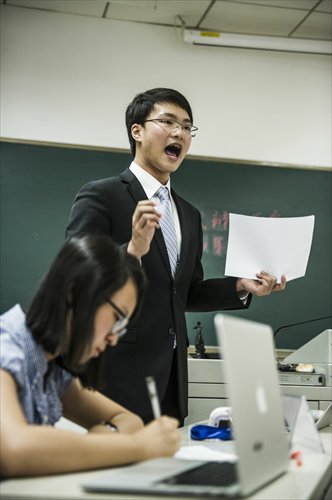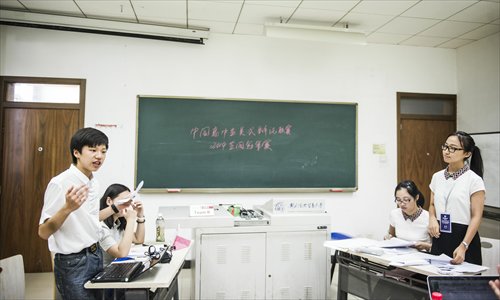I’m talking here!
American-style debate competitions encourage Chinese students to speak their minds

Around 320 contestants from over 90 national high schools participated in the 2014 National Championship Debate Tournament held in Beijing from August 9-10. Two debaters from Wuxi No.1 Senior High School, Jiangsu Province won the championship. Photo: Li Hao/GT
On a humid Sunday afternoon two weeks ago, nearly 1,000 people packed into a cavernous amphitheater on the campus of Beijing's University of International Business and Economics for the 2014 National Championship Debate Tournament held by the National High School Debate League of China (NHSDLC).
After two hard-fought days of competition, during which high school students from around the country exhausted their critical faculties and considerable vocabularies buttressing their own arguments and finding holes in those of their foes, the tournament had been whittled down to just two teams of two: one team from Wuxi No. 1 Senior High School in Jiangsu Province, the other from the Shanghai Foreign Language School.
Vanquished debaters, anxious family members and friends shuffled into compact rows of plush, upholstered red auditorium seats. Some supporters tugged at their skirts or adjusted their spectacle in an attempt to dispel their nerves, while others made hushed remarks, or waved at fellow competitors who had also fallen at an earlier hurdle. As the finalists and the judges took the stage, a generous round of applause erupted from the gallery.
The topic over which rhetorical knives were to be drawn: "Casino gambling should be legalized in the Chinese mainland."



These years have seen the rise of American-style debate teams as China's younger post-1990 generation wants more chances to sharpen their critical thinking and express their ideas. Photos: Li Hao/GT
A summary of the pertinent points
Given China's reputation among some Western media outlets as having a closed political system, where discussion and dissent over issues of national interest take place behind closed doors while the government presents a public front of unanimity, it may come as a surprise to some that such debating tournaments have been permitted to take place at all. But over the two years since its establishment, the NHSDLC has managed to not only survive, but thrive.
Launched at the end of 2012, the first tournament held by the NHSDLC attracted 1,500 contestants. Since then, the popularity of NHSDLC-run events has increased exponentially.
According to statistics provided by the organization, in this year alone they have organized nearly 40 regional competitions, with over 12,000 students from 300 high schools around the country participating in official tournaments or training events.
The National Championship is the jewel in the crown for the NHSDLC, as the best 160 teams determined by regional competitions gather together from around the country to determine the top debate team in China.
Gavin Newton-Tanzer, the American founder of the NHSDLC, told Metropolitan that he saw debate as an antidote of sorts to the emphasis on rote memorization that prevails in a large number of Chinese public schools.
Rather than expecting students to regurgitate well-worn arguments in which the conclusions are already foregone and accepted as doctrine, said Newton-Tanzer, debate encourages students to ask questions, view issues with suspicion, and develop their critical and creative thinking.
According to the Economist, debaters who do well in the national competition have been invited to participate in tournaments in the US, including those held on the prestigious campuses of Harvard and Stanford universities.
Caught in the crossfire
The debate format used by the NHSDLC is a variant of Public Forum Debate (PFD), a style of competitive debate that is common in the US. PFD is practiced widely across a number of competitions, including the National Speech and Debate Association, from which the NHSDLC has taken inspiration.
PFD is adversarial, pitting two teams, each with two members, at a loggerheads with each other over an issue, usually of political, economic, or social interest.
Previous topics, according to Newton-Tanzer, have included whether the death penalty should be abolished in China and whether the rise of China will be beneficial to the interests of the US.
Debaters are informed of the topics well in advance, but not which side of the argument they will be asked to advocate, whether for (or "pro" in PFD parlance) or against ("con").
This, Newton-Tanzer explained, means that debaters have to prepare both sides of the argument, and view an issue from all possible sides; they are expected to support their arguments on the day of the debate with evidence and research that has been prepared prior to the debate.
Whether a team has to argue pro or con is determined two minutes before the beginning of the debate, via a coin toss.
At a major regional or national tournament like the one that took place two weeks ago, just one topic is discussed throughout the debate rounds, from the five preliminary rounds to the elimination rounds. Based on probability, in most cases, teams that advance to the later rounds will have had to have argued both sides of a topic, usually multiple times.
In terms of the debate itself, the exchange of verbal volleys and linguistic retorts proceed in a number of formalized rounds with strict time limits, to ensure a coherent development of the arguments and so that the battle does not descend into a free-for-all. Broadly speaking, the rounds can be divided into the explication of the argument, in which the parameters, scope and issues of contention are defined; the development of the argument, about which issues of contention are developed and the substantive disagreements parried back and forth to try to establish an advantage; and a summary round, in which final arguments are made in an attempt to persuade the judges of the merits of one's own argument, and the inadequacies of the other teams.
A distinct feature of PFD that differs from other widely-practiced formats in England and the US, such as British Parliamentary or Oxford-style debates, is the interjection of "crossfire" rounds in between the formalized rounds of substantive arguments. In each crossfire round, debaters are able to question each other directly to clarify or reveal fallacies in the other's argument, each lasting three minutes.
The winning team is determined by a panel of judges, usually three, who will vote for the team that they believe better articulated their argument with sound, lucid reasoning supported by rigorous evidence and analysis, and presented in a way that was clear and comprehensible.
Also noteworthy is the fact that NHSDLC debates are all in English, despite being a domestic league for Chinese high school students.
Newton-Tanzer said that he believes this is one of the reasons for the fledgling league's rising popularity.
Many of the high school debaters who participate in the tournaments aspire to study in US colleges, and their involvement in English-language debates can help hone not only their critical faculties, but also their language skills, said Newton-Tanzer.
"You can see sparks from the clashes between the two sides, especially during the crossfire sections," said 17-year-old Tang Xiao, a student from the High School Affiliated to Renmin University of China who participated in this year's national tournament.
Tang has been offered a place at the University of Notre Dame in the US, and will begin her studies there in the fall semester of this year.
I think, therefore I am
Both organizers and participants agree that one of the biggest benefits of PFD is its ability to develop the critical and argumentative faculties of students, asking them to engage with issues beyond what they had previously learned, and look for creative solutions to problems that might otherwise seem to be open and shut cases at a first glance.
Yao Jianpeng, who coached six teams from Xiamen No.1 High School in Fujian Province to the NHSDLC national finals this year, spoke enthusiastically about how his students, through participation in PFD, were made to think and come up with ideas for themselves.
"The biggest difficulty [with typical Chinese students] is their incorrect or rigid way of thinking. Under the traditional Chinese education system, students are simply instilled with conclusions, without questioning or discussing how that conclusion was arrived at," said Yao.
"Students can easily blurt out the views reported by official media, such as the Xinhua News Agency and the People's Daily, but if ask them to speak their own minds, with their own voice, they don't know what to say."
"American-style debating demands a rigorous examination of arguments, supported by solid evidence," Yao told Metropolitan.
Li Xuechen, an 18-year-old debater from the Nanjing Foreign Language School, echoed Yao's comments.
Her team fell short at round 32 in this year's competition, but because of her involvement with NHSDC debates, she said she has been forced to pay greater attention to the important issues happening around her each day and to engage with them in a committed fashion rather than just superficially.
"I brainstorm and discuss topics with my debating partner until 11 pm every night in the school cafe," said Li, who also plans to attend university in the US after she graduates.
"Afterwards, I stay up to the wee hours to summarize our discussions and find new information. Sometimes, I sleep only three or four hours a night."
Beyond the debating hall
Because of the way debate cultivates students' ability to critically engage with issues from a wide range of perspectives, Newton-Tanzer sees this generation of debaters becoming China's future movers and shakers.
This year's national competition was eventually won by Yang Jiayun and Chen Yufan from Wuxi No.1 Senior High School, who argued for the pro side about whether gambling should be legalized in China.
Chen has already participated in debate camps in the US, and it seems fitting that he is given the final word.
"Debate has deepened my understanding of the issues our country is facing, and the policies we have to address them," he said.
"It's good for younger generations to arrive at a better understanding of social realities through open discussion," said Chen.